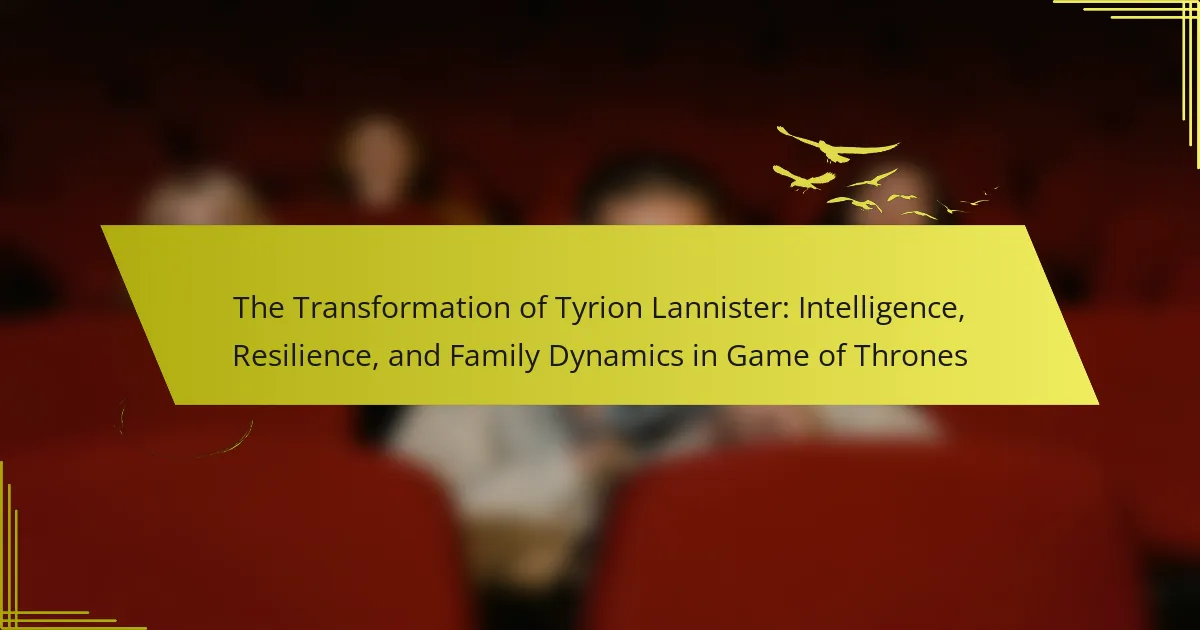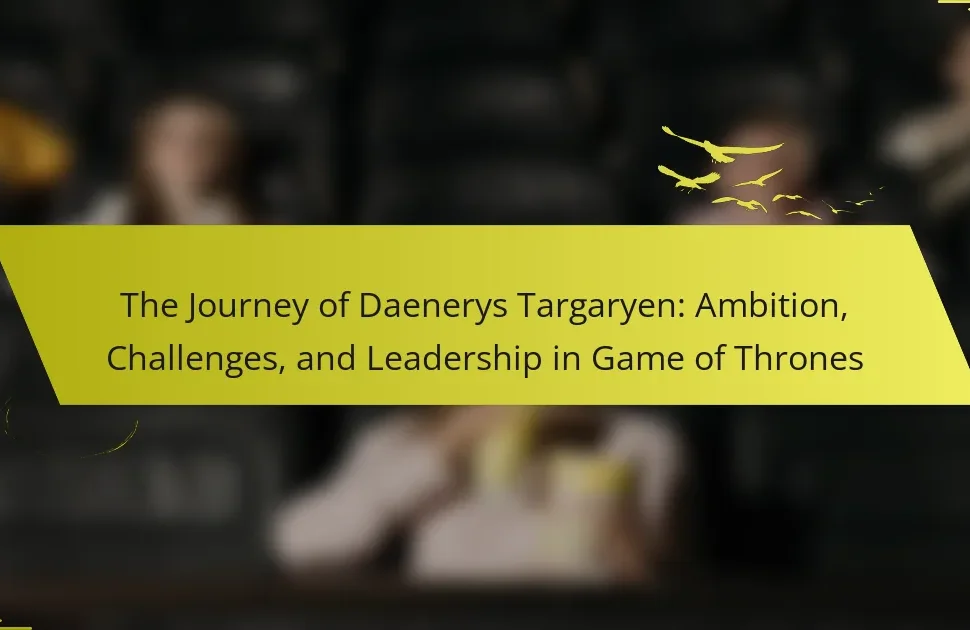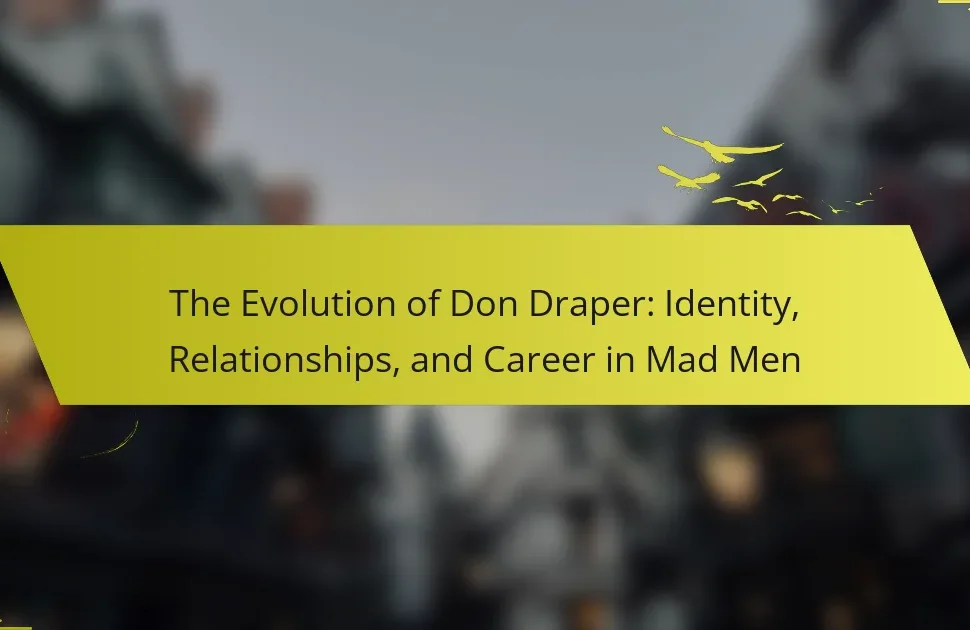Tyrion Lannister is a central character in the series “Game of Thrones,” known for his intelligence, resilience, and complex family dynamics. His journey from being an outcast due to his dwarfism to becoming the Hand of the King illustrates his strategic thinking and ability to navigate the political landscape of Westeros. The article examines how external factors, including family relationships with Tywin and Cersei, influence Tyrion’s character development and self-perception. It also explores the impact of significant events, such as the War of the Five Kings, on his moral compass and decision-making. Ultimately, Tyrion’s transformation reflects themes of loyalty, acceptance, and empowerment within a brutal world.
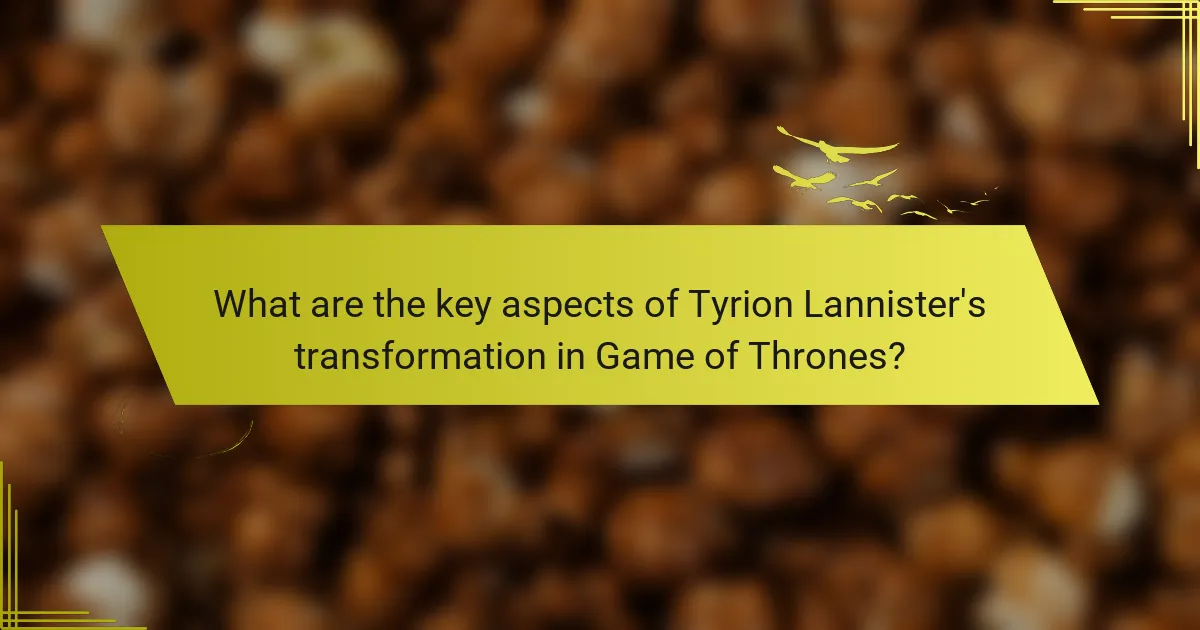
What are the key aspects of Tyrion Lannister’s transformation in Game of Thrones?
Tyrion Lannister’s transformation in Game of Thrones centers on his intelligence, resilience, and shifting family dynamics. Initially viewed as a mere outcast due to his dwarfism, Tyrion leverages his sharp wit and strategic thinking to navigate the treacherous political landscape. His resilience is evident as he faces betrayal and prejudice, ultimately rising to a position of power as Hand of the King. The evolution of his family relationships, particularly with his father Tywin and sister Cersei, highlights his struggle for acceptance and recognition. Throughout the series, Tyrion’s character embodies the complexities of loyalty, morality, and survival in a brutal world.
How does intelligence play a role in Tyrion’s character development?
Intelligence significantly influences Tyrion Lannister’s character development. His sharp wit and strategic thinking allow him to navigate complex political landscapes. Tyrion often uses his intelligence to outsmart opponents who underestimate him. This capability is evident when he successfully defends King’s Landing during the Battle of Blackwater. His intelligence also helps him form alliances and gain respect in a world dominated by physical strength. Despite facing prejudice due to his stature, Tyrion leverages his intellect to assert his value. This reliance on intelligence shapes his identity and resilience throughout the series. Ultimately, Tyrion’s character arc showcases how intelligence can be a powerful tool for survival and influence.
What strategies does Tyrion employ to showcase his intelligence?
Tyrion Lannister employs several strategies to showcase his intelligence. He uses wit and clever dialogue to outsmart opponents. Tyrion often engages in strategic planning, analyzing situations before acting. He leverages his knowledge of history and politics to influence decisions. Additionally, he employs manipulation, using others’ motivations to his advantage. Tyrion’s ability to read people allows him to anticipate their actions. He also utilizes humor to defuse tension and assert dominance. His resourcefulness in dire situations highlights his quick thinking. These strategies collectively demonstrate his sharp intellect throughout the series.
How does Tyrion’s intelligence influence his relationships with others?
Tyrion’s intelligence significantly influences his relationships with others. His sharp wit and strategic thinking allow him to navigate complex social dynamics. Tyrion often uses his intelligence to outmaneuver opponents and gain allies. This capability earns him respect among some and resentment from others. For instance, his relationship with Varys is built on mutual respect for each other’s cunning. Conversely, his intelligence creates tension with family members like Cersei, who view him as a threat. Additionally, Tyrion’s ability to empathize with others enhances his connections. He often understands people’s motivations, which helps him forge alliances. Overall, his intelligence serves as both a tool for survival and a source of conflict in his relationships.
In what ways does resilience shape Tyrion’s journey?
Resilience profoundly shapes Tyrion Lannister’s journey by enabling him to overcome adversity. Throughout “Game of Thrones,” Tyrion faces constant rejection and prejudice due to his stature. His resilience allows him to adapt and strategize effectively in perilous situations. For instance, he survives attempts on his life and navigates the complexities of political intrigue. Tyrion’s ability to endure hardship fosters his cleverness and resourcefulness. This resilience ultimately leads him to positions of power, such as serving as Hand of the King. His journey exemplifies how resilience transforms challenges into opportunities for growth and influence.
What challenges does Tyrion face that test his resilience?
Tyrion Lannister faces numerous challenges that test his resilience. He endures constant prejudice due to his stature as a dwarf. This discrimination shapes his worldview and drives him to prove his worth. Tyrion also grapples with familial betrayal, particularly from his father and sister. Their disdain forces him to navigate a treacherous political landscape. He experiences profound loss, including the deaths of loved ones like his mother and friends. Each loss deepens his emotional scars and tests his ability to cope. Tyrion’s struggle for acceptance and respect in a brutal world further compounds his challenges. These experiences collectively forge his resilience throughout the series.
How does Tyrion’s resilience contribute to his survival in Westeros?
Tyrion’s resilience significantly contributes to his survival in Westeros. His ability to adapt to challenging circumstances helps him navigate political intrigue. Tyrion faces prejudice due to his stature, yet he uses his intelligence to outsmart opponents. He often relies on wit and strategic thinking to avoid direct confrontation. This approach allows him to survive in hostile environments. For instance, he survives the deadly politics of King’s Landing by aligning with powerful figures. His resilience also manifests in his emotional strength during personal losses. Each setback strengthens his resolve and resourcefulness. Ultimately, Tyrion’s resilience is a key factor in his ability to endure and thrive in a treacherous world.
What role do family dynamics play in Tyrion’s transformation?
Family dynamics significantly influence Tyrion Lannister’s transformation. His relationships with his family shape his identity and resilience. Tyrion faces rejection from his father, Tywin, and disdain from his sister, Cersei. This treatment fosters his sense of isolation and drives him to seek validation through intelligence and wit.
His bond with his brother, Jaime, contrasts with the negativity from other family members. Jaime’s support provides Tyrion with a sense of belonging. Tyrion’s experiences with family lead him to develop a strong sense of self-reliance.
These dynamics push him towards strategic thinking and adaptability. The constant struggle for acceptance fuels his ambition and resourcefulness. Ultimately, family dynamics are central to Tyrion’s growth and transformation throughout the series.
How does Tyrion’s relationship with his family evolve throughout the series?
Tyrion’s relationship with his family evolves from disdain to a complex mix of acceptance and betrayal. Initially, Tyrion faces rejection and scorn, particularly from his father Tywin and sister Cersei. His status as a dwarf leads to constant ridicule and isolation within House Lannister. As the series progresses, Tyrion’s intelligence and strategic mind earn him a significant role in political affairs. He gains some respect from Tywin, especially when he serves as Hand of the King. However, this respect is overshadowed by betrayal when Tywin ultimately rejects him after Joffrey’s death. Tyrion’s relationship with Cersei remains antagonistic, culminating in her desire for vengeance. By the end, Tyrion’s estrangement is complete, yet he finds a sense of belonging with allies outside his family. This shift illustrates his journey from a marginalized member of House Lannister to a figure seeking autonomy and identity beyond familial ties.
What impact do family conflicts have on Tyrion’s identity?
Family conflicts significantly shape Tyrion Lannister’s identity. His experiences of rejection and scorn from his family influence his self-perception. Tyrion often grapples with feelings of inadequacy due to his father’s disdain and his siblings’ betrayal. These conflicts foster his resilience and intelligence as coping mechanisms. They drive him to seek validation through wit and strategic thinking. The family dynamics compel him to navigate complex social landscapes, shaping his moral compass. Ultimately, these conflicts contribute to his evolution from an underestimated outcast to a key player in the political arena.

How do external factors influence Tyrion Lannister’s transformation?
External factors significantly influence Tyrion Lannister’s transformation throughout “Game of Thrones.” His intelligence is often shaped by the political machinations around him. The constant power struggles in Westeros force him to adapt and strategize. Family dynamics also play a crucial role in his development. Tyrion’s relationship with his father and siblings impacts his self-perception and resilience. For instance, Cersei’s disdain and Tywin’s harsh treatment foster his desire to prove his worth. Additionally, external events, such as the War of the Five Kings, challenge his moral compass and decision-making. These influences collectively shape Tyrion into a more complex and resourceful character.
What societal expectations affect Tyrion’s actions and decisions?
Tyrion Lannister’s actions and decisions are significantly influenced by societal expectations surrounding his status as a dwarf. Society views him as inferior due to his physical stature. This perception drives Tyrion to prove his intelligence and capability beyond mere physical appearance. He often uses wit and strategic thinking to navigate complex political landscapes. Additionally, family dynamics play a crucial role in shaping his choices. His relationship with his father and siblings creates pressure to conform to their expectations. Tyrion’s desire for acceptance leads him to act in ways that challenge societal norms. He seeks to redefine what it means to be a Lannister, often acting against the grain of family expectations. These societal pressures compel him to adapt and survive in a world that marginalizes him.
How does Tyrion navigate the politics of Westeros?
Tyrion Lannister navigates the politics of Westeros through strategic intelligence and keen observation. He leverages his sharp wit to outmaneuver opponents. Tyrion often aligns with powerful allies, such as Daenerys Targaryen and Sansa Stark. He utilizes knowledge of people’s motivations to influence decisions. His ability to adapt to shifting political landscapes is notable. Tyrion also employs diplomacy, often opting for negotiation over conflict. He understands the importance of information, frequently gathering intelligence to stay ahead. His experiences with betrayal shape his cautious approach to trust.
What external pressures shape Tyrion’s character development?
Tyrion Lannister’s character development is shaped by familial rejection, societal prejudice, and political intrigue. His family’s disdain, particularly from Tywin and Cersei, reinforces his feelings of isolation. This rejection drives him to seek validation through intelligence and wit. Societal prejudice against his dwarfism further complicates his relationships and self-perception. He often faces discrimination, which fuels his resilience and adaptability. Political intrigue in Westeros forces Tyrion to navigate complex power dynamics. His experiences in King’s Landing expose him to manipulation and betrayal. These external pressures collectively contribute to his growth and transformation throughout the series.
How do other characters influence Tyrion’s growth?
Other characters significantly influence Tyrion Lannister’s growth throughout the series. His relationship with his father, Tywin Lannister, shapes his resilience and intelligence. Tywin’s harsh treatment instills a desire in Tyrion to prove his worth. Sansa Stark offers Tyrion emotional support, fostering his capacity for empathy. The bond with Jon Snow encourages Tyrion to embrace his moral compass. Varys serves as a mentor, guiding Tyrion’s political acumen. Daenerys Targaryen challenges Tyrion to adapt and strategize effectively. Each character’s interaction contributes uniquely to Tyrion’s development and self-identity.
What lessons does Tyrion learn from key relationships?
Tyrion Lannister learns the importance of trust and loyalty from his relationships. His bond with Jon Snow teaches him that honor can exist in unexpected places. From his relationship with Sansa Stark, he learns the value of empathy and understanding. His interactions with Cersei highlight the dangers of betrayal and manipulation. Through his friendship with Bronn, Tyrion understands the complexities of loyalty based on mutual benefit. Each relationship shapes his perspective on power and vulnerability. These lessons contribute to his growth and resilience throughout the series.
How do allies and enemies impact Tyrion’s choices?
Allies and enemies significantly influence Tyrion Lannister’s decisions throughout “Game of Thrones.” His allies provide essential support and resources. For example, Varys and Bronn offer strategic advice and assistance. These relationships enable Tyrion to navigate complex political landscapes. Conversely, his enemies create obstacles and force him to adapt. Cersei and the Lannister family often undermine his authority. This constant pressure compels Tyrion to be more cunning and resourceful. Ultimately, the dynamics of his relationships shape his strategies and choices in critical moments.
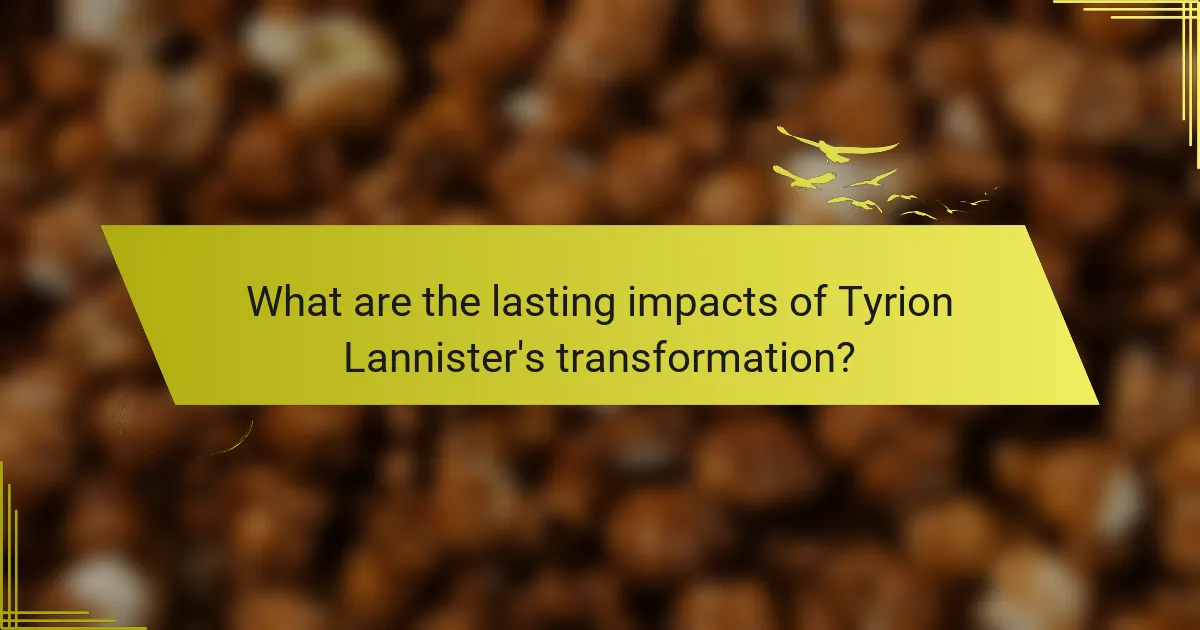
What are the lasting impacts of Tyrion Lannister’s transformation?
Tyrion Lannister’s transformation leads to significant impacts on his character and relationships. His intelligence becomes a key asset in navigating political challenges. This strategic thinking earns him respect among allies and enemies alike. His resilience shapes his ability to endure personal and familial betrayals. This endurance fosters a deeper understanding of loyalty and trust. Tyrion’s transformation also alters his relationship with family members, particularly with Cersei and Jaime. He evolves from a marginalized figure to a pivotal player in Westeros. This shift influences the dynamics of power among the noble houses. Ultimately, Tyrion’s transformation signifies a journey of self-acceptance and empowerment.
How does Tyrion’s journey reflect broader themes in Game of Thrones?
Tyrion’s journey reflects broader themes in Game of Thrones through his struggles with identity, power, and morality. His status as a dwarf shapes his experiences and perspectives. Tyrion’s intelligence often contrasts with the brutality of the world around him. He navigates political intrigue while facing prejudice from his family and society. This highlights the theme of survival amidst adversity. His resilience demonstrates the importance of wit over brute strength. Additionally, Tyrion’s relationships, especially with his family, illustrate the complexities of loyalty and betrayal. Ultimately, his journey emphasizes the quest for acceptance and the moral dilemmas faced by individuals in a morally ambiguous world.
What does Tyrion’s story reveal about power and vulnerability?
Tyrion’s story reveals that power often coexists with vulnerability. He navigates the treacherous political landscape of Westeros despite being marginalized due to his stature. His intelligence becomes his primary source of power, allowing him to outmaneuver opponents. However, his vulnerability stems from his family dynamics and societal prejudice. Tyrion’s reliance on wit highlights how intellect can compensate for physical limitations. His experiences demonstrate that those in power can still be deeply affected by personal insecurities. The contrast between his strategic prowess and emotional struggles illustrates the complex nature of power. Ultimately, Tyrion’s journey emphasizes that vulnerability can exist alongside, and even enhance, one’s capacity for power.
How does Tyrion embody the struggle for acceptance and belonging?
Tyrion Lannister embodies the struggle for acceptance and belonging through his experiences as a marginalized figure in his family and society. He faces constant prejudice due to his stature as a dwarf. This discrimination fuels his desire for validation and connection. Tyrion often seeks approval from his father, Tywin, who openly disdains him. His intelligence and wit serve as coping mechanisms in his quest for belonging. Throughout “Game of Thrones,” he forms bonds with characters like Jon Snow and Sansa Stark, highlighting his need for companionship. These relationships illustrate his longing for acceptance beyond his family ties. Ultimately, Tyrion’s journey reflects the universal human desire for recognition and love amidst adversity.
What practical lessons can be learned from Tyrion Lannister’s transformation?
Tyrion Lannister’s transformation teaches the importance of resilience and adaptability. He faces prejudice due to his stature yet uses his intelligence to navigate challenges. His strategic thinking allows him to turn adversities into advantages. Building alliances is crucial for overcoming obstacles, as seen in his relationships with various characters. Embracing one’s unique attributes can lead to empowerment, as Tyrion does with his wit and intellect. Additionally, understanding family dynamics is vital; he learns to balance loyalty and self-preservation. His journey illustrates that personal growth often stems from hardship and self-reflection.
How can individuals apply Tyrion’s resilience and intelligence in their own lives?
Individuals can apply Tyrion’s resilience and intelligence by embracing challenges and thinking critically. Resilience involves facing adversity with a positive mindset. Tyrion exemplifies this by overcoming his family’s prejudice and societal expectations. He uses his intelligence to strategize and navigate complex situations. Individuals can adopt a similar approach by analyzing problems and seeking creative solutions. Additionally, developing strong communication skills can enhance one’s ability to persuade and influence others, as Tyrion often does. This combination of resilience and intelligence can empower individuals to thrive in their personal and professional lives.
What strategies can be adopted to navigate complex family dynamics like Tyrion?
Adopting strategies to navigate complex family dynamics like Tyrion involves effective communication, emotional intelligence, and strategic alliances. Tyrion often uses wit to diffuse tension. This approach fosters understanding among family members. He also demonstrates empathy, recognizing others’ feelings and perspectives. This skill helps him build stronger relationships. Furthermore, forming alliances within the family can provide support. Tyrion often aligns with those who share his interests or goals. This strategy enhances his influence and security. Lastly, maintaining a sense of humor can lighten difficult situations. Humor can ease conflicts and create a more approachable atmosphere. These strategies exemplify how to effectively manage intricate family dynamics.
The main entity of the article is Tyrion Lannister, a character from Game of Thrones known for his intelligence, resilience, and complex family dynamics. The article explores Tyrion’s transformation from an outcast due to his dwarfism to a prominent political figure, emphasizing how his sharp wit and strategic thinking enable him to navigate the treacherous landscape of Westeros. It examines the impact of familial relationships on his identity, particularly his struggles with rejection from his father and sister, and highlights the role of external factors and societal expectations in shaping his character. Key themes include the interplay of power and vulnerability, the quest for acceptance, and practical lessons drawn from Tyrion’s journey.
